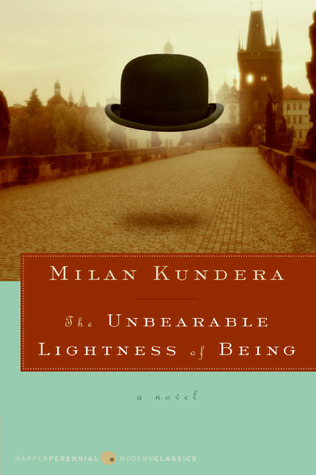I read the Unbearable Lightness of Being by Milan Kundera as a teenager, and I was immediately mesmerised by what I regarded as a ground-breaking philosophical essay on human nature...
Almost 30 years later, I am re-reading this book and I am at a loss. Where is the philosophy I remembered? why am I bored with what I read? why do I start skipping passages?
This is one of my greatest fears come true: my outlook on life has changed so dramatically vis-a-vis my teenage years, that one of my "classic" reads is torn to pieces...
In the Unbearable Lightness of Being, the story evolves around the principle that every event occurs only once - we live once, every action of ours happens once, thus our being is "light". We are not affected by Nietzsche's eternal recurrence, which would weight us down and become burdensome.
The plot of the book is taking place in Prague during the cold war, studying the lives of four main characters - and a dog. We follow Tomáš, a surgeon and a sworn womaniser, helplessly in love with his wife Tereza. She goes through a traumatic childhood and eventually becomes alienated from people. Completing the couple is Sabina, Tomáš's favourite mistress and confidante, determined to fight kitsch (...) and Franz, Sabina's lover, a tragic idealist whose end is as common as one can think of. Karenin, the dog, will be the catalyst for reuniting Tomáš and Tereza through her smile...
The majority of the novel dwells on the lightness of love and sex, which, however important to the lives of people, do not gain enough status to influence their decisions. Kundera is using the encounters between the main characters to search for answers for his philosophical questions on coincidence and misinterpretation, of a body reflecting the soul, and of music being set in our older years, with few possibilities for new additions, among other themes.
While I was intrigued by this part of the book, where Kundera analyses his questions/answers, I could not warm up to the stories of the characters themselves. I could not sympathise with their agonies, their fears, their search for answers - I honestly found them superficial. I was so upset at this discovery that I wanted to understand why - and I believe it's simply a matter of timing. When this book appeared in 1984, it was a revelation in the art of writing and I'm certain it made people think about existentialism - this was still the era of a divided Europe on the one hand, but also a prosperous (western) Europe on the other that steered clear from the non-material aspects of life. Nowadays, we've moved on at a fast pace. The cold war is over, Europe is for the most part united - but prosperity no longer exists, and terrorist attacks have made us realise long ago what the real meaning of life is (or so I hope).
In that sense, I found the book slightly outdated and it is for this reason I removed it from my Classics Club book list. It hasn't transferred well through time and, while I appreciate its effect on people when it was published, I cannot see it appealing to me anymore...
Read for the European Reading Challenge

One of my greatest fear of re-reading is that this happens... When I was a teen my tolerance (and even desire) for melodrama, deep thoughts and books about the inevitability of human misery was much (MUCH!) greater than now...
ReplyDeleteit's so bittersweet, that's what's bothering me...
DeleteLike you, I read this years ago and loved it. I wonder if my thoughts would be similar to yours on a reread....
ReplyDeleteI was so surprised myself...
Delete